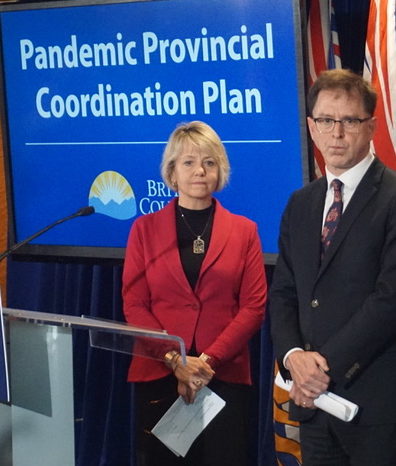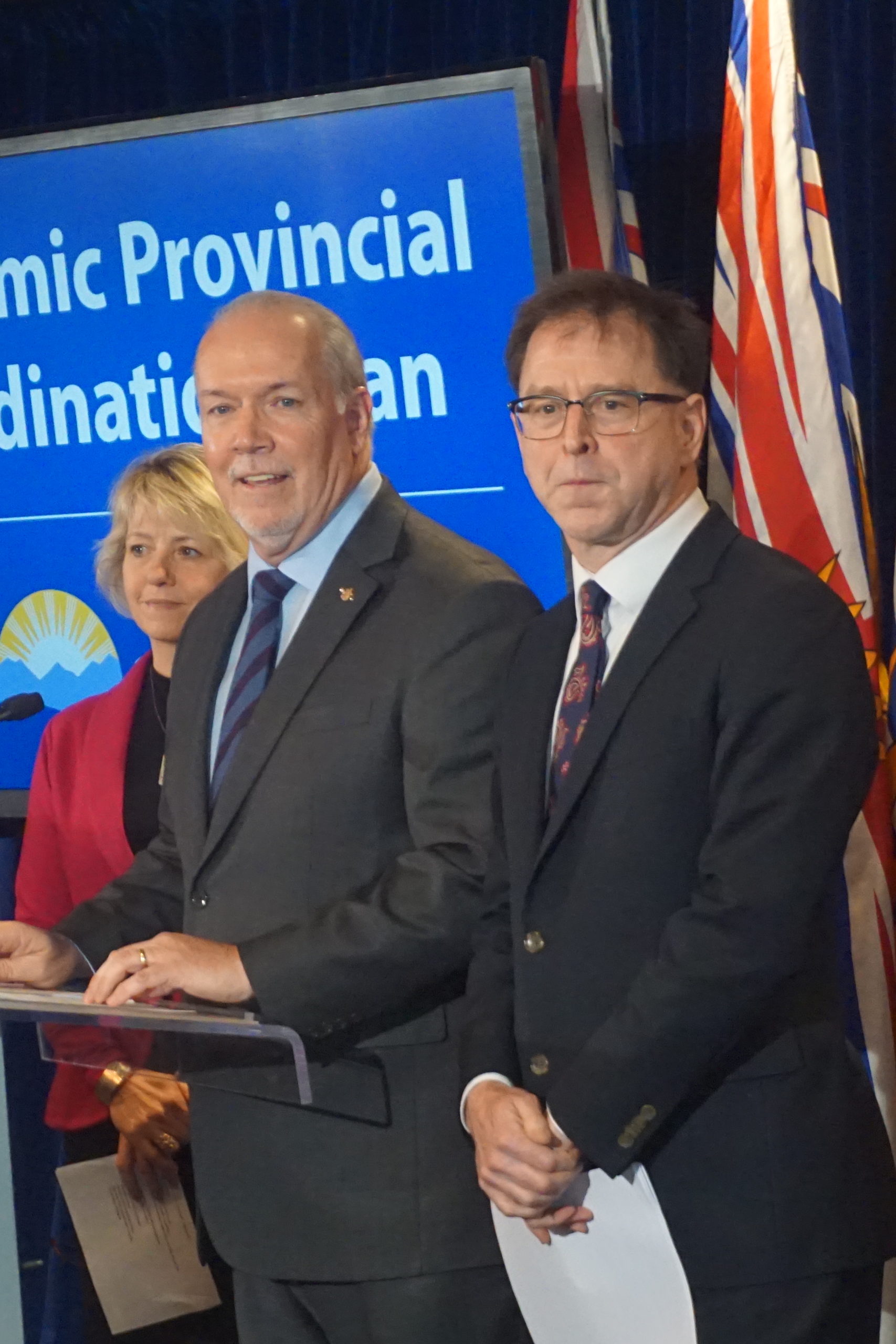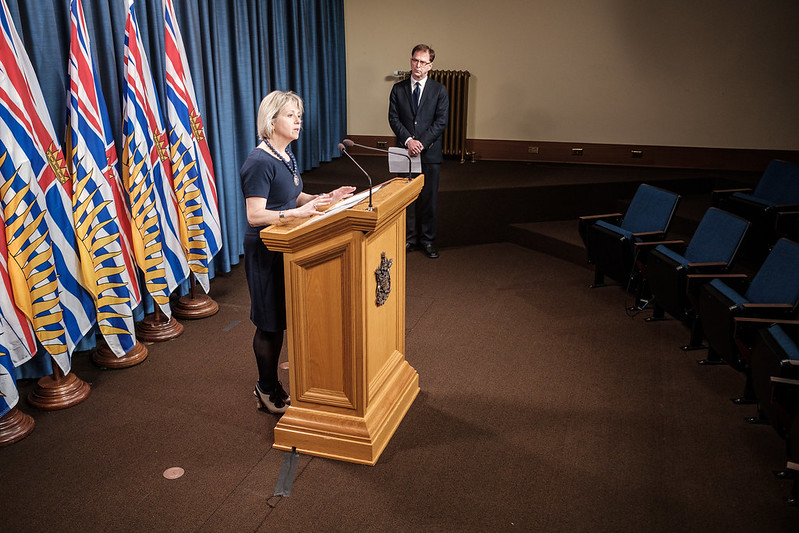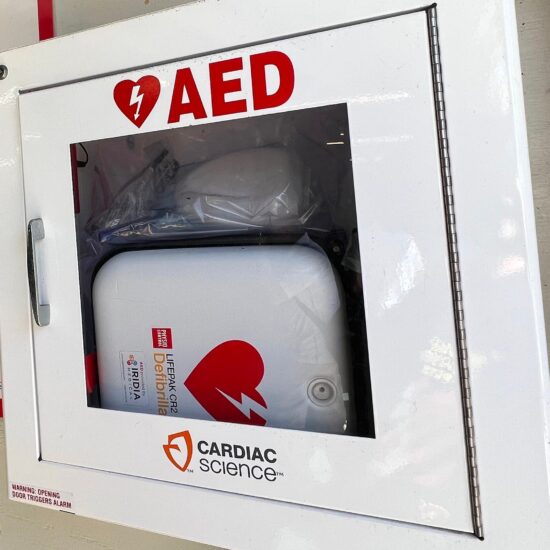
Bob Mackin
To the average British Columbian, the weekdays at 3 p.m. news conference with Health Minister Adrian Dix and Provincial Health Officer Dr. Bonnie Henry might look like an exercise in transparency.
The coronavirus pandemic update is instead a master class of corporate-style communications for the B.C. government, which is always measuring what it does through a political lens. (The stakes are high: There is an election scheduled in October 2021 and the NDP will be judged on how it manages the pandemic.)
The news conferences generally last 45 minutes, but only half or less of the time is given to questions from reporters, who are limited to one question only. No followup. (Prime Minister Justin Trudeau routinely allows reporters to ask one question and a followup.)
This is the most-controlled communication exercise in B.C. government history. Not even the Vancouver 2010 Winter Olympics were this regimented.
The B.C. government’s joint information centre through the Government Communications and Public Engagement department often instructs reporters to wait for the next day’s Dix and Henry news conference. As if it is that easy to have a question answered in the limited time allowed.
With that in mind, I am sharing 10 questions that British Columbians need answered about the coronavirus pandemic and the economic crisis.
1.
British Columbians have been told to stay home and, if ill, isolate themselves. On April 14, the World Health Organization issued a warning about alcohol use: “At times of lockdown during the COVID-19 pandemic, alcohol consumption can exacerbate health vulnerability, risk-taking behaviours, mental health issues and violence.” On the same day, the B.C. government extended B.C. liquor store hours to 7 a.m. to 11 p.m.
- Question: Did the Provincial Health Officer, Minister of Health and/or the Minister of Mental Health and Addictions approve the revenue-generating extension of B.C. liquor store hours?

Dr. Bonnie Henry (left), Premier John Horgan and Health Minister Adrian Dix (Mackin)
2.
On the same theme of staying home and being in isolation. The 2014 B.C. Problem Gambling Prevalence Study found 57% of online gamblers gamble alone and 52% use alcohol or drugs while gambling.
- Question: Who decided that B.C. Lottery Corp.-contracted video poker dealers (who webcast from a studio in the New Westminster riding of the Minister of Mental Health and Addictions) are an essential service under the state of emergency regulations?
3.
On March 23 during Question Period, Minister of Health Dix said these words: “And we’re doing right now, in the last two days over the weekend, approximately 3,500 tests a day.” B.C. Center for Disease Control statistics for the number of samples on March 21 and 22 did not come close to “3,500 tests a day” (there were 1,963 and 2,036 tests, respectively). In fact, only once did coronavirus testing in B.C. reach close to 3,500 in one day (3,480 on March 16).
- Question: Does Minister Dix plan to correct the record at the next sitting of the Legislature and explain how and why he gave misleading information?
4.
- Question: Who was the elected or appointed official in the NDP B.C. government that proposed or lobbied the Information and Privacy Commissioner to make an extraordinary decision on March 18 that allows public bodies in B.C. to delay disclosures under the freedom of information law by an additional 30 business days, until June and July (despite the public interest override that requires disclosure of any and all records about an imminent risk to public health)?
5.
- Question: While B.C. MLAs of all parties are to be commended for delaying their statutory cost of living increase, will the Premier, cabinet ministers, deputy ministers and Crown corporation CEOs take a temporary and voluntary pay cut, like New Zealand Prime Minister Jacinda Ardern who cut cabinet and Crown CEO salaries by 20%?

- Dr. Bonnie Henry (left) and Adrian Dix on March 26 (BC Gov)
6.
The NDP government’s $5 billion emergency economic package passed March 23 will include aid for businesses big and small.
- Question: For any companies that receive bailouts from B.C. taxpayers, will the NDP follow the lead of the European Union and mandate executive salaries be capped and executive bonuses be banned?
7.
In March, Royal Columbian Hospital emergency room Dr. Sean Wormsbecker accused B.C. of under-testing for coronavirus, therefore low-balling the number of people carrying the disease in B.C. Australia is also testing 1% of the population, but an Australian actuary’s modelling estimates six to seven times more people are infected than the government has disclosed. In Santa Clara County, Calif., Stanford University School of Medicine researchers estimate the number of people infected is at least 50 times greater than the confirmed cases reported by public health officials.
- Question: What is the estimate of the number of people in B.C. who were really infected with COVID-19?
8.
British Columbia is not the only jurisdiction where mass deaths occurred in senior citizens’ care homes. Federal authorities fined Life Care Center in Kirkland, Wash. $611,000 for various violations. Owners of Residence Herron in Dorval, Que. are under police and coroner investigation.
- Question: Why is there no investigation into North Shore Private Hospital, the company that owns Lynn Valley Care Centre, where 20 people died of coronavirus?
9.
Until March 12, Dix and Henry reported on a daily basis about anonymized individual cases in B.C., including the patient ages and gender, transmission type, patient status, date reported and health authority of jurisdiction. That stopped on March 13. Ontario has never stopped providing this type of information to its citizens.
- Question: Why do Ontario citizens get anonymized case data but British Columbians don’t?
10.
The World Health Organization has been blunt in its coronavirus-fighting instructions to all countries: test every suspected case. Yet, in B.C., officials narrowed testing to residents of senior citizens’ care homes, healthcare workers and the sickest who present at a hospital emergency ward.
- Question: What was the real reason why B.C. doctors were not allowed until April 8 to order testing for any patient showing symptoms?
Support theBreaker.news for as low as $2 a month on Patreon. Find out how. Click here.
- Looking for information on how to keep yourself and others healthy amid the coronavirus pandemic? Do you have symptoms? Click here for all you need to know, from HealthLinkBC.











